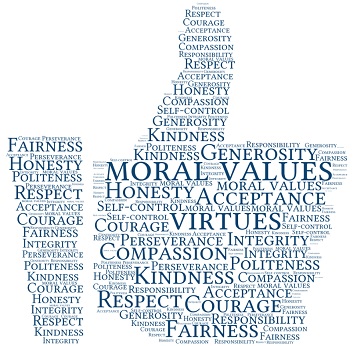Raising kids means eventually being asked some tough questions. They'll ask questions ranging from the meaning of life to what happens after we die. To keep it interesting there will also be many questions in between!
If you are raising your children in the same religion you were raised in, these answers may be readily provided. What happens if you've rejected the religion you were raised in? How do you provide guidance in life's big questions when you're not sure yourself?
In her book In Good Faith: Secular Parenting in a Religious World, Maria Polonchek describes her journey. Raised in an evangelical Christian home, she started questioning many of her religion's beliefs as a teen. She describes her process of leaving this church and searching for other ways of answering life's big questions.
When one of her young sons asks "Who is God?" she realizes that she doesn't have pat answers like her parents did. How can she and her husband raise kids with moral values without the support of a church? She discusses her thoughts and feelings as she searches for answers.
They discover the Unitarian Universalist religion which supports diverse beliefs. By the time they first go to this church, their oldest twins are 9-years-old and prefer other activities on Sundays rather than going to church. Because of her own upbringing, Polonchek was reluctant to bring her kids to any church before they were able to reason on their own. Unfortunately by the time they are able to reason, they can give plenty of reasons why they should not have to go to church!
Interestingly we raised our kids in a Unitarian church because it allowed both my husband and my beliefs to co-exist. I wanted our kids to have a foundation in religion. The Unitarian church provides an excellent educational program including exploring various world religions.
If you are exploring how to raise moral kids without relying on religion, Polonchek's book will give you ideas from her path.
Supporting Kids Through Heartbreaking Rejection
Being rejected hurts. You love your kids and never want to see them hurt. Unfortunately you cannot prevent your children from experiencing rejection. Whether it’s not being selected for a team or not having a date for the dance, feeling rejected is painful.
Your response in these situations can provide a healing salve for your child’s wounds or deepen the pain. When you let them know that you value and love them regardless of what has happened, you provide comfort. Knowing they always have your love is a powerful antidote.
Threatening To Remove Connection
Everyone has a deep need for connection with others. When children want to hurt others, one way they do it is by threatening to remove connection.
Words can hurt. This is especially true when they are words of rejection. Even young children know the power of saying things like:
Kids need lots of practice developing their interpersonal skills. When you hear kids saying something unkind, help them find healthier ways to express their emotions.
Experiencing a Crushing Blow
Trying out for a team takes courage. Unless your child is guaranteed to make the team, there is the risk of failure. Responding when your child makes the team is easy. The difficult part is how you respond when your child does not make the team.
(continue reading article on PricelessParenting.com)
Your response in these situations can provide a healing salve for your child’s wounds or deepen the pain. When you let them know that you value and love them regardless of what has happened, you provide comfort. Knowing they always have your love is a powerful antidote.
Threatening To Remove Connection
Everyone has a deep need for connection with others. When children want to hurt others, one way they do it is by threatening to remove connection.
Words can hurt. This is especially true when they are words of rejection. Even young children know the power of saying things like:
- "I'm not your friend anymore."
- "I don't want to play with you."
- "You're not invited to my birthday party!"
- "I hate you!"
Kids need lots of practice developing their interpersonal skills. When you hear kids saying something unkind, help them find healthier ways to express their emotions.
Experiencing a Crushing Blow
Trying out for a team takes courage. Unless your child is guaranteed to make the team, there is the risk of failure. Responding when your child makes the team is easy. The difficult part is how you respond when your child does not make the team.
(continue reading article on PricelessParenting.com)
Improving Your Family Dynamics
How have things been going for your family this past week? When were you feeling happy and content? What situations left you feeling frustrated, angry or sad?
When you reflect back, think about what has gone well and what parts feel out of alignment. If you could change anything what would it be?
Acknowledging Problems
Recognizing what isn’t working well is the first step in making a positive change. When parents report their biggest challenges, they describe problem behaviors like:
- Not listening
- Throwing tantrums
- Disobeying
- Hitting people
- Back talking
- Being a picky eater
- Sibling fighting
- Being disrespectful
- Not getting homework done
- Arguing and questioning
Responding in Better Ways To Your Kids’ Challenging Behavior
(finish reading this article at PricelessParenting.com)
Sage Questions For Teens Graduating From High School To Ponder
Do you know someone graduating from high school? Are you looking for a meaningful graduation gift? Hal Runkel's new book, Choose Your Own Adulthood is a perfect match!
Graduating from high school is an important milestone in anyone's life. There are many choices to be made and the decisions determine the direction of one's life. When Runkel's daughter was leaving for college, he handed her a book he had written to help guide her. Now he's sharing that wisdom in this book.
The book discusses choices and guides you to considering the ramifications of different decisions. How will you handle dating? What will you spend your time pursuing? What are your principles and how will they guide you? How can you get focus on the work you most value? What does it take to finish a project or save for your future? What are the benefits of being real instead of trying to be perfect? This book will help your teen think through these important questions and more!
Graduating from high school is an important milestone in anyone's life. There are many choices to be made and the decisions determine the direction of one's life. When Runkel's daughter was leaving for college, he handed her a book he had written to help guide her. Now he's sharing that wisdom in this book.
The book discusses choices and guides you to considering the ramifications of different decisions. How will you handle dating? What will you spend your time pursuing? What are your principles and how will they guide you? How can you get focus on the work you most value? What does it take to finish a project or save for your future? What are the benefits of being real instead of trying to be perfect? This book will help your teen think through these important questions and more!
Parenting Wisdom From Special Needs Kids
Chris Ulmer, a special education teacher, founded Special Books by Special Kids to share the unique personalities of his students with the wider community. While his videos do capture these kids' personalities, they do far more than that. They demonstrate how to treat kids in ways that encourage the very best in them.
This parenting wisdom page pulls together a few videos that do an exceptional job demonstrating key components in raising kind, caring kids.
This parenting wisdom page pulls together a few videos that do an exceptional job demonstrating key components in raising kind, caring kids.
Improving Family Harmony By Increasing Positive Interactions
How are you feeling about each of your children? There are times when you probably find it easy to love your kids and appreciate their wonderful qualities. Undoubtedly there are other times when you may struggle to find positive things to say to them.
One mom lamented that it was hard to think of anything positive to say to her 13-year-old daughter. She felt her daughter was not working up to her potential. She found herself nagging and correcting her daughter which had led to her daughter not wanting to be around her mom.
Intimate parent-child relationships are filled with ups and downs. When your children are behaving well, it’s easy to be with them and show them love. However the real challenge comes in maintaining a positive relationship when they are not behaving the way you would like.
Building Loving Relationships
Do you find yourself feeling angry or frustrated by your kids more often than you’d like? How do you create the warm loving relationship you desire?
One key ingredient is making sure you have more positive than negative interactions with them. Dr. John Gottman has researched couples to learn what makes relationships last. Gottman found that “The magic ratio is 5:1. In other words, as long as there are five times as many positive interactions between partners as there are negative, the relationship is likely to be stable.”
(finish reading article on PricelessParenting.com)
One mom lamented that it was hard to think of anything positive to say to her 13-year-old daughter. She felt her daughter was not working up to her potential. She found herself nagging and correcting her daughter which had led to her daughter not wanting to be around her mom.
Intimate parent-child relationships are filled with ups and downs. When your children are behaving well, it’s easy to be with them and show them love. However the real challenge comes in maintaining a positive relationship when they are not behaving the way you would like.
Building Loving Relationships
Do you find yourself feeling angry or frustrated by your kids more often than you’d like? How do you create the warm loving relationship you desire?
One key ingredient is making sure you have more positive than negative interactions with them. Dr. John Gottman has researched couples to learn what makes relationships last. Gottman found that “The magic ratio is 5:1. In other words, as long as there are five times as many positive interactions between partners as there are negative, the relationship is likely to be stable.”
(finish reading article on PricelessParenting.com)
Protecting Kids From Pornography Problems
Unfortunately kids are being exposed to pornography at younger and younger ages. Increasing mobile internet access is enabling them to easily view porn either unintentionally or intentionally.
Many kids get exposed to porn by their friends who are eager to share what they’ve discovered. This is what happened to Mae, a 6-year-old, who was shown an explicit video by her 11-year-old friend. Although Mae felt this wasn’t right, it awakened her curiosity to see more videos like this. Viewing porn led Mae to inappropriately acting in sexual ways with other kids. When her parents finally learned what was going on they were devastated and got her into counseling.
Another mom talked about getting her 12-year-old son into therapy after she caught him in the middle of the night viewing porn. She learned he had been viewing porn since he was 8-years-old and was spending increasing amounts of time on it. She was shocked it had gone on so long without her realizing it.
So what can you do to protect your kids from porn? There are things you can do including educating them about their bodies, warning them about the problems with porn and discussing ways to turn away from porn.
Educating Your Kids About Their Bodies
All kids are curious about their bodies. You want to be the source of this education, not the internet or their friends.
(finish reading article on PricelessParenting.com)
Many kids get exposed to porn by their friends who are eager to share what they’ve discovered. This is what happened to Mae, a 6-year-old, who was shown an explicit video by her 11-year-old friend. Although Mae felt this wasn’t right, it awakened her curiosity to see more videos like this. Viewing porn led Mae to inappropriately acting in sexual ways with other kids. When her parents finally learned what was going on they were devastated and got her into counseling.
Another mom talked about getting her 12-year-old son into therapy after she caught him in the middle of the night viewing porn. She learned he had been viewing porn since he was 8-years-old and was spending increasing amounts of time on it. She was shocked it had gone on so long without her realizing it.
So what can you do to protect your kids from porn? There are things you can do including educating them about their bodies, warning them about the problems with porn and discussing ways to turn away from porn.
Educating Your Kids About Their Bodies
All kids are curious about their bodies. You want to be the source of this education, not the internet or their friends.
(finish reading article on PricelessParenting.com)
Resolving Conflicts Using Collaborative & Proactive Solutions
Do your children have challenging behaviors that keep reoccurring? If so, you probably have tried numerous things that haven't worked: time outs, grounding, withholding privileges, taking away toys, taking away the computer, TV or cellphone, and talking about the problem. Nothing has helped!
By definition, challenging behavior is difficult to solve. The reason nothing has worked is because the underlying cause of the problem has not been addressed. The trick is figuring out the root cause of the problem behavior.
Three Approaches to Solving Problem Behavior
Dr. Ross Greene has worked extensively with kids who are acting out at home and school. Over the years he has developed an approach that leads to success with most of these kids.
He discusses three options to misbehavior in his book Raising Human Beings. He refers to these options as Plan A, Plan B and Plan C.
Plan A – Announcing the Solution
You solve the problem by letting your child know what is going to happen. You make the decision based on your expertise without your child’s input. Greene explains “Plan A involves solving a problem unilaterally, and it’s very popular. When you solve a problem using Plan A, you are the one deciding the solution to a given unsolved problem, and you’re imposing that solution on your child.”
For example, you might say things like:
(finish reading article on PricelessParenting.com)
By definition, challenging behavior is difficult to solve. The reason nothing has worked is because the underlying cause of the problem has not been addressed. The trick is figuring out the root cause of the problem behavior.
Three Approaches to Solving Problem Behavior
Dr. Ross Greene has worked extensively with kids who are acting out at home and school. Over the years he has developed an approach that leads to success with most of these kids.
He discusses three options to misbehavior in his book Raising Human Beings. He refers to these options as Plan A, Plan B and Plan C.
Plan A – Announcing the Solution
You solve the problem by letting your child know what is going to happen. You make the decision based on your expertise without your child’s input. Greene explains “Plan A involves solving a problem unilaterally, and it’s very popular. When you solve a problem using Plan A, you are the one deciding the solution to a given unsolved problem, and you’re imposing that solution on your child.”
For example, you might say things like:
(finish reading article on PricelessParenting.com)
Subscribe to:
Comments (Atom)
Are your kids being targeted for sextortion?
Scammers are targeting kids for sextortion. They convince kids that nude pictures of them will be distributed to family, friends, classmate...

-
Susán Hoemke dreamt of a perfect family - a loving husband and four beautiful children. When their oldest son, Hayden, became addicted...
-
Is your teen presenting extremely challenging behavior? If you feel overwhelmed and unsure of how to help your teen, getting professional h...
-
Scammers are targeting kids for sextortion. They convince kids that nude pictures of them will be distributed to family, friends, classmate...






